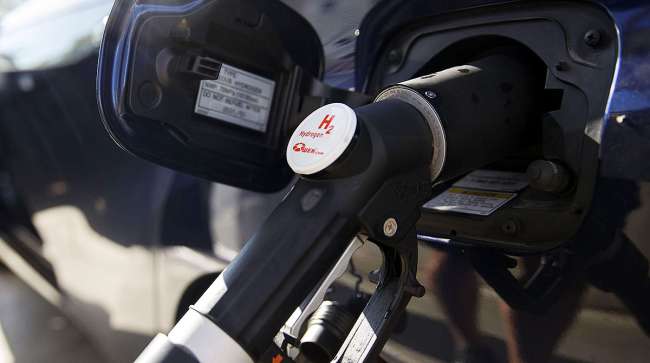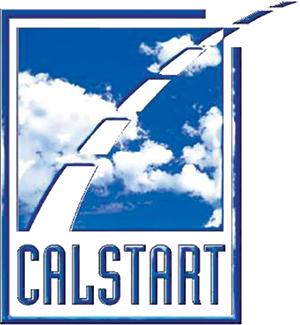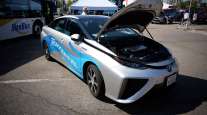Senior Reporter
Advocates of Hydrogen Fuel Are Primed for Global Markets

[Stay on top of transportation news: Get TTNews in your inbox.]
The CEO of Nel ASA, a Norwegian company founded in 1927 and the largest manufacturer of electrolyzer technology that produces hydrogen from water, said Nel is ready to “cut and paste” its manufacturing approach in locations around the world as interest in the alternative fuel climbs.
In the United States, Nel is a partner of Nikola Corp., which intends to have a hydrogen fuel cell Class 8 in production by 2023 and the needed fueling stations in select locations. It placed an initial order with Nel for 448 electrolyzers in 2018.
Other truck makers, including Daimler AG, Hyundai, Paccar Inc. and Volvo Group, are involved in developmental efforts.
The cost of #hydrogen solutions is set to fall sharply within the next decade for a wide range of applications. #H2 is already becoming competitive today, says @nelhydrogen CEO @jonandrelokke in @The_IPHE’s #GlobalH2Forum2020. #HydrogenNow pic.twitter.com/VW4kBtjPOY — Hydrogen Council (@HydrogenCouncil) June 18, 2020
“We have raised a lot of capital so we are basically ready to push forward and expand our facilities,” Nel CEO Jon André Løkke told an online global forum organized June 18 by the International Partnership for Hydrogen and Fuel Cells in the Economy. The United States is a founding member and currently the chair of IPHE.
He said there are some concerns the financial benefits of the emerging hydrogen economy will flow back in large part to Norway. “I can encourage you that is not the case. If you build an electrolyzer facility, whether in Australia or South America, significantly more than 50% of the value creation, maybe up to 70%, will happen locally.”

COVID-19 has placed significant strain on many freight networks. So how are third-party logistics providers adapting to meet these challenges? Host Seth Clevenger chats with two 3PL executives who have had firsthand experience contending with this crisis. Hear a snippet, above, and get the full program by going to RoadSigns.TTNews.com.
He added Nel has 3,500 electrolyzers in 80 countries and data on some that have been in operation for 20 years, lending credence, and performance guarantees, to proposals for funding a new site.
“We think this transition [away from petroleum-based fuels] will happen sooner rather than later,” Løkke said.
There was also discussion online of in what currency the price of hydrogen should be stated.
One expert later told Transport Topics that would not make much difference in the price of hydrogen but it could make a “very big difference for the currency.”
“Let’s use oil as the example. It’s priced in U.S. dollars, period,” said Jeffery Born, professor of finance at Northeastern University. “So no matter who you are, if you want to buy oil, you have to have or buy dollars first, before you get the oil. The huge volume of trade in oil provides support and stability for the value of the U.S. dollar compared with other currencies.

Linebarger
“The impact on the price of oil is pretty small. However, in some parts of the world it’s painful to have to buy U.S. dollars. Sometimes it’s economic pain with transaction costs. Other times it’s political. Even Russian and Iranian oil is priced in U.S. dollars. There is also a certain cachet that comes with one’s currency being designated for use worldwide. If hydrogen is not priced in U.S. dollars it might seem like it is not a big deal today, but it could become quite important if hydrogen was to replace carbon-based fuel sources.”
Cummins Inc. — the largest manufacturer of Class 8 diesel engines for the U.S. market — also believes “prosperity is driven by sustainability,” CEO Tom Linebarger told the forum. “We believe hydrogen can play a significant role in the global economy.”
The company has made several announcements in the past year related to fuel cell technologies.
Meanwhile, in California, the newly formed National Zero-Emission Truck Coalition issued its first series of priority policy recommendations.
New on the blog: Some of the biggest names in trucking are calling for federal support of electric trucks and buses https://t.co/wOK4mon9AP — EDF Energy Program (@EDFEnergyEX) June 18, 2020
In a release June 18, the coalition called on the federal government to provide $2 billion to support a voucher program to accelerate sales of medium- and heavy-duty trucks, rebates or grants to develop the infrastructure and an additional $250 million to support ongoing research and development.
Among the coalition members are all leading U.S. truck makers along with commercial vehicle suppliers Eaton Corp. and Cummins. Tesla and Nikola Corp. belong. So do BYD, Chanje and Lion Electric, and the Environmental Defense Fund does, too.

“America has the power to lead in the expanding, zero-emission truck market,” said Bill Van Amburg, executive vice president at Calstart, which organized the coalition. “But we must take an active role. Other nations are investing aggressively.”
Calstart is a nonprofit organization focused on the growth of the clean transportation technology industry.
While the coalition effort did not specify preferred technologies, Nikola President Mark Russell said in a recent online investor presentation that Nikola, Toyota Motor Corp., Hyundai and Royal Dutch Shell are also working together to develop common features for hydrogen fueling.
“We want to make this standard, the same nozzle, hose receptacle on every vehicle in every station on the planet,” Russell said. A fast-fueling protocol has been developed that will allow filling a heavy-duty truck in less than 15 minutes.
“That’s about the same time as it takes a diesel [to fuel],” Russell said. “One of the great advantages of a fuel cell vehicle over batteries alone, besides weight, is that fast fueling.”
Want more news? Listen to today's daily briefing:
Subscribe: Apple Podcasts | Spotify | Amazon Alexa | Google Assistant | More




